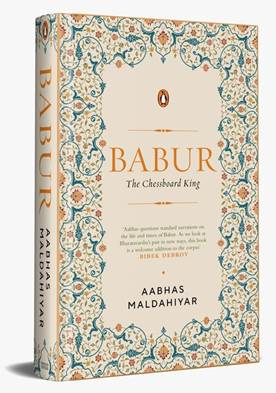· Portrays Babur as a multifaceted ruler, challenging the typical depiction of an infallible conqueror and a benevolent human being
· Brings to light his adept navigation through political intricacies and adversities
· The story of Babur’s unyielding pursuit of power amid treacherous political landscapes
Written by Aabhas Maldahiyar, published by Penguin Random House India, the gripping, anecdotal and deeply researched Babur: The Chessboard King delves into Hindustan’s economic landscape during Timurid rule and portrays Babur as a multifaceted ruler, challenging the typical depiction of an infallible conqueror and a good human being.
Babur, the visionary founder of Timurid Empire in Hindustan, had a fair share of early struggle following his father’s tragic demise in AD 1494. Then on, Babur embarked on an unyielding pursuit of power amid treacherous political landscapes, the narrative unveils his moniker, ‘the chessboard king,’ portraying his adept navigation through political intricacies and adversities.
From his ascent to rulership in Ferghana amidst familial threats to fleeting victories and losses in Samarkand, the book paints a poignant picture of Babur’s journey. It portrays his retreat to tribal lands after relinquishing hopes of reclaiming Ferghana, eventually establishing a mountainous kingdom in Kabul, a pivotal milestone preceding his ambition to expand into Hindustan. Recounting his initial endeavour to penetrate Hindustan in AD 1505, his alliances, and subsequent setbacks after Sultan Husayn Mirza Bayqarah’s demise, leaving him as the sole Timurid prince in power, the book opens a window to Babur’s failed second attempt to enter Hindustan, encapsulating the initial thirteen to fourteen tumultuous years of his reign, marked by exile, fleeting victories, and delicate alliances.
Meticulously sourced from the Persian manuscript of the Baburnama and other primary sources, this book represents a milestone in Babur’s biographical genre, essential for comprehending the ambitions of this enigmatic king.
It is currently on pre-order and will be released in India in mid-February.
About the author
Aabhas Maldahiyar, an Architect and Urban-Designer, amalgamates an intense love for History with captivating storytelling. He champions the seamless fusion of History and Architecture, recognizing their intrinsic connection in narrative creation. His architectural masterpieces, envisioned as repositories of future stories, ignite his diverse literary odyssey, spanning Marxist and Ex-Marxist phases. Initially embracing Marxism in architecture school, a visit to Ajanta's caves ignited a profound transformation. Shifting from Marxist literature to crafting fiction inspired by the Red Ideology, he delved deeper into the realms of History and Politics. His inaugural nonfiction, Modi Again: An Ex-Communist's Manifesto (2019), chronicles his remarkable journey. Babur: The Chessboard King stands as the inaugural volume in his forthcoming series on ‘Timurid Gurkaniyan’ (erroneously known as Mughals), founded on primary sources. A skilled reader of Persian manuscripts, Aabhas offers a distinctive lens to historical narratives.

